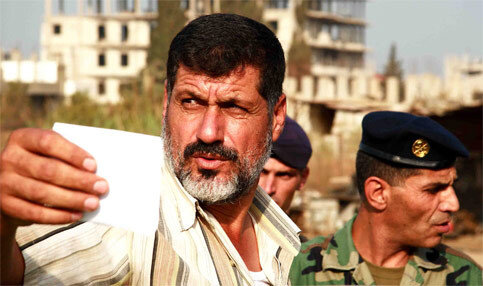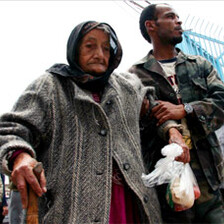Electronic Lebanon 12 October 2007

The first Palestinian families displaced by fighting between the army and Islamist militants began returning to the ruined Nahr al-Bared camp on 10 October. (Hugh Macleod/IRIN)
NAHR AL-BARED, 12 October (IRIN) - The first Palestinian families displaced by 15 weeks of intense fighting between the army and Islamist militants that left much of north Lebanon’s Nahr al-Bared refugee camp in ruins have begun returning home to start rebuilding their lives.
“I never imagined I would have to leave my home again,” said 80-year-old Mahmoud Nimr Abdou as he boarded the bus carrying the first refugees home from neighboring Baddawi camp, where the majority of the up to 40,000 people displaced from Nahr al-Bared have been living in cramped conditions. “I will kiss the ground when I return.”
Security was extremely tight at the narrow, dusty checkpoint at Mahamra, on the eastern flank of Nahr al-Bared, with the army checking papers and searching vehicles one by one as they queued to re-enter the camp between rolls of razor wire.
Only the elderly, women and children were allowed back into the camp on 10 October for security reasons, according to military officials at the scene. Journalists were not allowed inside Nahr al-Bared also for security reasons.
Some 4,000 set to return in coming week
Hassan Deeb Yehya, his wife and four children were one of the 100 families waiting to return to the camp on 10 October. A total of 800 families will be returning over the coming week, according to the UN’s Palestinian relief organization, UNRWA, and Palestinian officials.
“We already know our house is damaged, but we don’t know how badly,” said 28-year-old Yehya. “We’ve spent the whole summer living in a classroom, doing nothing except just waiting for a ceasefire. I am happy to be returning today, but I hope Nahr al-Bared is only a temporary residence before I can return to Palestine.”
Fighting between the army and the al-Qaeda-inspired militants of Fatah al-Islam broke out on 20 May after the Islamists attacked army positions around Nahr al-Bared. In a 15-week bombardment of the camp, the army killed or captured over 400 militants and lost 168 soldiers, while at least 40 civilians were killed.
The dangers of life for refugees in the heavily shelled camp were immediately highlighted after a piece of unexploded ordnance hidden in a car tire exploded, injuring three people on 10 October.
“Within an hour of opening our clinic we already had three injuries from an explosion,” said Yousef Asaad, of the Palestine Red Crescent Society, which is running a makeshift clinic inside Nahr al-Bared for returning refugees. The army has been demining the camp and deemed the section of the new camp to which refugees were allowed to return yesterday clear.
Asaad said the camp had been divided into six sections, with only one section currently accessible. Asked to estimate the damage in the section he said half the buildings were completely destroyed, while the other half were damaged. Many buildings in the camp have been reduced to rubble, while others have been severely burned or sustained heavy damage. Almost all buildings visible from the edge of the camp have shrapnel damage and are pock-marked with bullet holes. Some refugees had to return to Baddawi on 10 October after they found their homes uninhabitable.
Even if all 800 families, around 4,000 people, are able to return home over the coming week, the figure represents a small fraction of the up to 40,000 displaced from the Nahr al-Bared.
Controversial accommodation units
Hoda al-Turk, a spokeswoman for UNRWA said the agency would finish construction of 32 temporary accommodation units on a plot of land at Bhanine, just south of Nahr al-Bared, despite facing resistance from the local population, many of whom say they do not want Palestinians as neighbors any more. A further 122 units are due to follow shortly.
Tensions between Palestinians, local Lebanese and the army have been building as the crisis unfolded, and were on display on 10 October at the Mahamra checkpoint.
“Let doomsday come and then we will all be judged,” cursed Asaad Haj Asaad, a 22-year-old mechanic from Nahr al-Bared, watching as Lebanese soldiers argued with an elderly man over the papers needed to return to the camp.
“I just want to take a rifle and kill those soldiers who destroyed our camp. How can we live under Lebanese law when they destroyed us?”
Accusations of looting
Asaad accused the army of looting houses in Nahr al-Bared, an accusation backed up by international volunteers from the non-profit group Nabaa, who accompanied the refugees home yesterday.
“I have seen fridges with shrapnel damage for sale in the market in Tripoli,” said Asaad. “I’ve been going to the same market for years and I’ve never seen so many fridges or cookers for sale. My neighbor told me she saw her furniture for sale there.”
The military denies that it allowed soldiers or outsiders to loot the camp.
UNRWA’s Hoda al-Turk said the agency had so far received 45 percent in pledges to an initial appeal, made last month, for US$55m to begin rebuilding Nahr al-Bared. As well as providing water, food and household items to the returning refugees, al-Turk said the agency saw an opportunity in the reconstruction of the camp to improve overall living conditions.
“We will be upgrading the infrastructure and providing more recreational space. We will rebuild much more from an urban planning perspective.”
This item comes to you via IRIN, a UN humanitarian news and information service, but may not necessarily reflect the views of the United Nations or its agencies. All IRIN material may be reposted or reprinted free-of-charge; refer to the copyright page for conditions of use. IRIN is a project of the UN Office for the Coordination of Humanitarian Affairs.
Related Links


